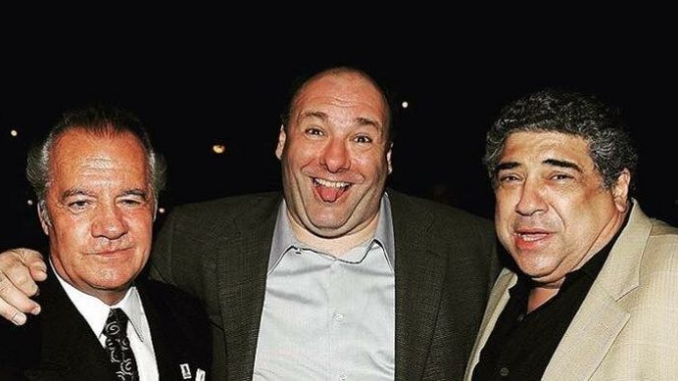
Exclusive Interview: Felix Gillette on Why The Sopranos Was a Game-Changer for HBO
When Felix Gillette, co-author of It’s Not TV: The Spectacular Rise, Revolution, and Future of HBO, talks about The Sopranos, it’s clear that he sees the show as far more than just a groundbreaking piece of television. To him, The Sopranos marks a massive turning point in the history of HBO and the entire television industry. In this exclusive interview, we dive into why The Sopranos wasn’t just a show about mobsters, but a radical shift in how TV was made, consumed, and understood.
The Sopranos: A Revolutionary Show for HBO
When The Sopranos debuted in 1999, it did more than redefine the gangster genre—it redefined television itself. For HBO, the series was not only a game-changer in terms of content but also in how the network approached programming. Felix Gillette, who co-authored It’s Not TV with HBO’s former CEO Chris Albrecht, believes The Sopranos played a pivotal role in shaping the brand identity that HBO holds today.

HBO’s Identity Before The Sopranos
Before The Sopranos, HBO had already made a name for itself with its premium cable model, offering uncut, uncensored films and exclusive stand-up specials. But it wasn’t until the late 1990s that the network began to establish itself as a true competitor in the scripted television space.
Felix explains that while HBO was known for offering a unique viewing experience with films and specials, it wasn’t yet recognized as a pioneer in original series. That all changed with The Sopranos.
“Before The Sopranos, HBO was kind of the ‘edgy’ network, but there was no singular flagship show that made people say, ‘This is why I subscribe to HBO,'” Felix reflects. “When The Sopranos arrived, it was like the perfect storm: a talented creator like David Chase, brilliant actors like James Gandolfini, and a show that wasn’t afraid to push boundaries.”
David Chase’s Vision: A Game-Changing Approach to Storytelling
At the heart of The Sopranos’ success was David Chase, the show’s creator and executive producer. Felix Gillette notes that Chase’s bold vision for the show, mixing the intricacies of family drama with the violence of the Mafia, laid the foundation for future programming on HBO. The show’s dark, psychological portrayal of Tony Soprano—a mob boss struggling with anxiety and therapy—was a stark departure from the formulaic, episodic dramas that dominated television at the time.
“What David Chase did was flip the idea of what a protagonist could be,” Felix explains. “Tony Soprano was neither a traditional anti-hero nor a straight villain. He was complex, conflicted, and deeply human. This wasn’t just a gangster story. It was about family dynamics, mental health, and the daily struggles of power. In many ways, The Sopranos was the precursor to the more layered storytelling that we now see in shows like Breaking Bad and Mad Men.”
HBO’s Risk and Reward: The Power of Premium Cable
The decision to air The Sopranos on HBO was a bold move. At the time, HBO was the only major network willing to take risks with original, high-budget series. Felix points out that this risk-taking was essential to the success of The Sopranos.
“One of the main things HBO had going for it was that they didn’t have to worry about traditional network pressures—ratings, advertisers, and the constant need for mass appeal. This allowed them to take risks and make shows like The Sopranos, where they weren’t just trying to please the broadest audience,” Felix says. “HBO was able to create these shows with full creative freedom, which was huge. David Chase didn’t have to worry about censorship or the typical TV conventions. He was free to tell the story he wanted.”
Felix notes that the HBO model of subscription-based revenue was critical to fostering this creative freedom. Unlike broadcast or even basic cable networks that relied heavily on advertising and thus had to cater to a broad demographic, HBO’s subscription-based model meant they had a more specific and committed audience. This created a space for shows like The Sopranos to thrive.
Breaking Boundaries: Violence, Psychology, and Family Drama
One of the elements that set The Sopranos apart from typical mob dramas was its deep psychological insight into its characters. Tony Soprano, played by James Gandolfini, was a complex, deeply flawed character—an anti-hero, a mob boss, but also a man seeking therapy to cope with his emotional turmoil. The show did more than tell the story of a mafia family; it explored the psyche of a man torn between his responsibilities as a crime boss and his desire to be a good father and husband.
Felix explains that The Sopranos helped redefine what television could achieve. It wasn’t just about entertainment—it was about exploration of the human condition.
“Television was never really allowed to go into the kind of psychological depth that we saw in The Sopranos,” Felix says. “The show treated its audience as smart and discerning, willing to sit through complex, layered storytelling. Tony’s therapy sessions were not just for comic relief or plot convenience—they were a way to explore his internal struggle. This psychological element resonated with viewers on a deeper level and set a new precedent for TV dramas.”
The Sopranos as a Cultural Touchstone
Felix Gillette also highlights the cultural significance of The Sopranos, noting that it wasn’t just a hit show—it became a cultural phenomenon. The show touched on themes that resonated with viewers far beyond the Mafia genre: family dynamics, moral ambiguity, identity, and the conflict between modernity and tradition. Tony Soprano was not just a mob boss; he was a reflection of the struggles facing many men in a rapidly changing world.
“The Sopranos tapped into something that wasn’t just specific to Italian-American families or mob culture. It explored universal themes—what it means to be a father, a husband, and a man in a world that’s changing around you,” Felix explains. “The show spoke to a certain generation of viewers who were grappling with questions of identity, masculinity, and societal roles.”
Legacy: How The Sopranos Changed Television
Perhaps the most significant aspect of The Sopranos’ influence on HBO was how it signaled the beginning of the ‘Golden Age of Television’. Felix points out that the success of The Sopranos paved the way for a new era of television, where creators were allowed to take risks, experiment with storytelling, and produce series that were more nuanced and complex than anything seen before.
“The golden age of television really began with The Sopranos. It wasn’t just about telling a story—it was about creating an experience,” Felix says. “After The Sopranos, we saw the rise of shows like Deadwood, The Wire, and later Game of Thrones. HBO became known for creating these long-form, serialized dramas that changed the way we thought about television.”
This legacy is still alive today, as HBO continues to be at the forefront of innovative programming with shows like Succession and Euphoria.
Felix’s Final Thoughts on The Sopranos’ Impact
As we wrap up the conversation, Felix Gillette reflects on the long-lasting impact The Sopranos had—not just on HBO, but on the entire landscape of television.
“People will always talk about The Sopranos as the show that made everything else possible,” he concludes. “It was the moment when television shifted from a medium of simple entertainment to a space where truly cinematic storytelling could happen. It gave creators the freedom to think bigger, bolder, and more creatively. And that’s why we’re still feeling its influence today.”
Conclusion: The Sopranos and HBO’s Unstoppable Rise
As Felix Gillette’s insights reveal, The Sopranos wasn’t just a TV show—it was a seismic shift in the television landscape. For HBO, it wasn’t just about pushing the boundaries of storytelling, but about creating an entirely new standard for what television could achieve. With The Sopranos, HBO proved that TV could be just as compelling, complex, and culturally relevant as any blockbuster movie.
As we continue to see bold new shows coming from HBO, it’s clear that The Sopranos remains the gold standard—a show that not only revolutionized the medium but also laid the groundwork for the future of television.